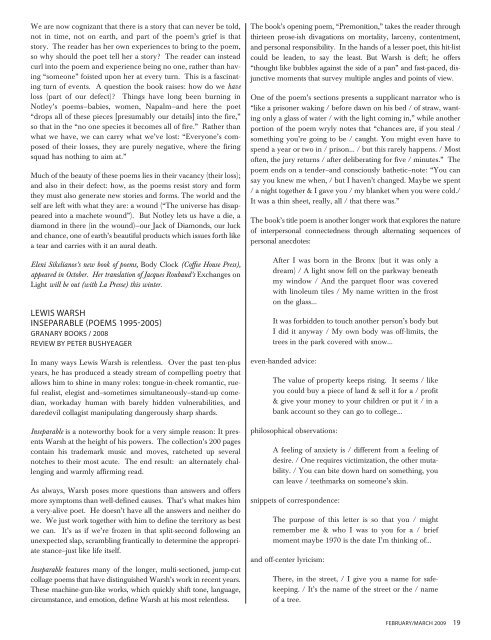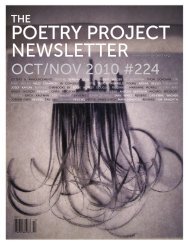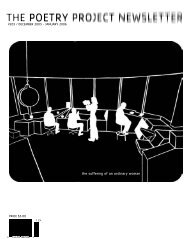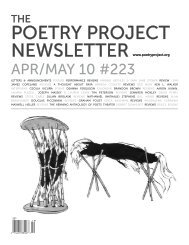Download PDF - The Poetry Project
Download PDF - The Poetry Project
Download PDF - The Poetry Project
You also want an ePaper? Increase the reach of your titles
YUMPU automatically turns print PDFs into web optimized ePapers that Google loves.
We are now cognizant that there is a story that can never be told,not in time, not on earth, and part of the poem’s grief is thatstory. <strong>The</strong> reader has her own experiences to bring to the poem,so why should the poet tell her a story? <strong>The</strong> reader can insteadcurl into the poem and experience being no one, rather than having“someone” foisted upon her at every turn. This is a fascinatingturn of events. A question the book raises: how do we haveloss (part of our defect)? Things have long been burning inNotley’s poems—babies, women, Napalm—and here the poet“drops all of these pieces [presumably our details] into the fire,”so that in the “no one species it becomes all of fire.” Rather thanwhat we have, we can carry what we’ve lost: “Everyone’s composedof their losses, they are purely negative, where the firingsquad has nothing to aim at.”Much of the beauty of these poems lies in their vacancy (their loss);and also in their defect: how, as the poems resist story and formthey must also generate new stories and forms. <strong>The</strong> world and theself are left with what they are: a wound (“<strong>The</strong> universe has disappearedinto a machete wound”). But Notley lets us have a die, adiamond in there (in the wound)—our Jack of Diamonds, our luckand chance, one of earth’s beautiful products which issues forth likea tear and carries with it an aural death.Eleni Sikelianos’s new book of poems, Body Clock (Coffee House Press),appeared in October. Her translation of Jacques Roubaud’s Exchanges onLight will be out (with La Presse) this winter.LEWIS WARSHINSEPARABLE (POEMS 1995-2005)GRANARY BOOKS / 2008Review by PETER BUSHYEAGERIn many ways Lewis Warsh is relentless. Over the past ten-plusyears, he has produced a steady stream of compelling poetry thatallows him to shine in many roles: tongue-in-cheek romantic, ruefulrealist, elegist and–sometimes simultaneously–stand-up comedian,workaday human with barely hidden vulnerabilities, anddaredevil collagist manipulating dangerously sharp shards.Inseparable is a noteworthy book for a very simple reason: It presentsWarsh at the height of his powers. <strong>The</strong> collection’s 200 pagescontain his trademark music and moves, ratcheted up severalnotches to their most acute. <strong>The</strong> end result: an alternately challengingand warmly affirming read.As always, Warsh poses more questions than answers and offersmore symptoms than well-defined causes. That’s what makes hima very-alive poet. He doesn’t have all the answers and neither dowe. We just work together with him to define the territory as bestwe can. It’s as if we’re frozen in that split-second following anunexpected slap, scrambling frantically to determine the appropriatestance–just like life itself.Inseparable features many of the longer, multi-sectioned, jump-cutcollage poems that have distinguished Warsh’s work in recent years.<strong>The</strong>se machine-gun-like works, which quickly shift tone, language,circumstance, and emotion, define Warsh at his most relentless.<strong>The</strong> book’s opening poem, “Premonition,” takes the reader throughthirteen prose-ish divagations on mortality, larceny, contentment,and personal responsibility. In the hands of a lesser poet, this hit-listcould be leaden, to say the least. But Warsh is deft; he offers“thought like bubbles against the side of a pan” and fast-paced, disjunctivemoments that survey multiple angles and points of view.One of the poem’s sections presents a supplicant narrator who is“like a prisoner waking / before dawn on his bed / of straw, wantingonly a glass of water / with the light coming in,” while anotherportion of the poem wryly notes that “chances are, if you steal /something you’re going to be / caught. You might even have tospend a year or two in / prison... / but this rarely happens. / Mostoften, the jury returns / after deliberating for five / minutes.” <strong>The</strong>poem ends on a tender–and consciously bathetic–note: “You cansay you knew me when, / but I haven’t changed. Maybe we spent/ a night together & I gave you / my blanket when you were cold./It was a thin sheet, really, all / that there was.”<strong>The</strong> book’s title poem is another longer work that explores the natureof interpersonal connectedness through alternating sequences ofpersonal anecdotes:After I was born in the Bronx (but it was only adream) / A light snow fell on the parkway beneathmy window / And the parquet floor was coveredwith linoleum tiles / My name written in the froston the glass...It was forbidden to touch another person’s body butI did it anyway / My own body was off-limits, thetrees in the park covered with snow...even-handed advice:<strong>The</strong> value of property keeps rising. It seems / likeyou could buy a piece of land & sell it for a / profit& give your money to your children or put it / in abank account so they can go to college...philosophical observations:A feeling of anxiety is / different from a feeling ofdesire. / One requires victimization, the other mutability./ You can bite down hard on something, youcan leave / teethmarks on someone’s skin.snippets of correspondence:<strong>The</strong> purpose of this letter is so that you / mightremember me & who I was to you for a / briefmoment maybe 1970 is the date I’m thinking of...and off-center lyricism:<strong>The</strong>re, in the street, / I give you a name for safekeeping./ It’s the name of the street or the / nameof a tree.february/march 2009 19
















